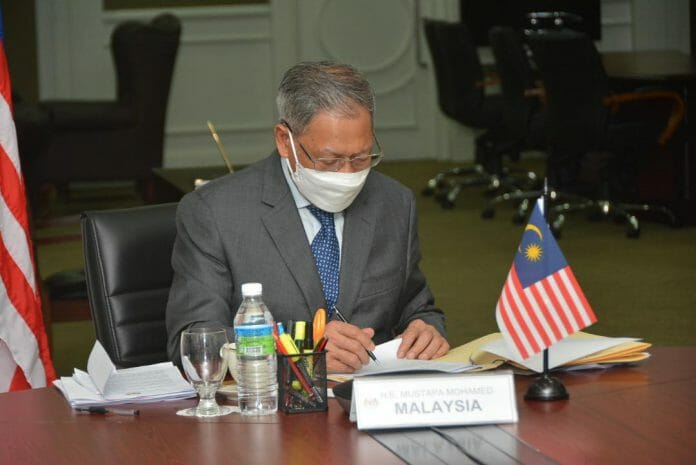Minister in the Prime Minister Department (Economy) Dato Sri Mustapa Mohamed says sustainability considerations have become an important feature in the global economic and financial landscape and Malaysia is preparing for the climate change challenge.
Speaking at the “Advancing Sustainability: Preparing the Economy for the Climate Challenge” event today, he says awareness of ESG or sustainability considerations are gaining momentum.
“For example, a Malaysian company (i.e. MRCB) has been part of the UN Global Compact as early as 2008. However, more than 75% of the 109 Malaysian participants in the Compact only joined at the beginning of 2019. Adoption of ESG practices among corporates in Malaysia is evident with more companies included in the FTSE4Good Bursa Malaysia Index. Since its inception in 2014, the index has grown from 24 companies to 76 as of June 2021. Looking at FTSE Emerging scores, for Malaysia and most countries, companies perform strongest on the Governance dimension, followed by Social and Environmental,” he says at the Economic Action Council Dialogue on advancing sustainability, focusing on preparing the Malaysian economy for the climate challenge.
Advancing sustainability is one of the main themes of the 2021 – 2025 Twelfth Malaysia Plan launched by our Prime Minister last month.
The Prime Minister made the commitment for Malaysia to become a carbon-neutral nation, at the earliest by 2050. The focus today on the climate challenge is also timely in the context of the ongoing COP26 in Glasgow.
The financial sector is moving in the same direction. Malaysian Islamic financial institutions started to integrate ESG considerations into their business strategies and operations with the introduction of the Value-Based Intermediation (VBI) initiative by Bank Negara Malaysia in 2017.
The Securities Commission also issued Guidelines on Sustainable and Responsible Investment (SRI) Funds in 2017 and released the SRI Roadmap for the Malaysian Capital Market (SRI Roadmap) in 2019. In April this year, the central bank introduced the Climate Change and Principles-Based Taxonomy to encourage financial institutions to integrate climate change considerations in all aspects of their business strategies and operations.
The SC is also developing an SRI taxonomy, in order to more efficiently categorize sustainable investments from those that are less sustainable.
In early August, the Government announced the Perkukuh Pelaburan Rakyat (PERKUKUH) initiative to refresh the mandate of six Government Linked Investment Companies (GLICs). This will see ESG considerations becoming central in investment decisions of national assets.
“All these developments indicate that firstly, ESG adoption is gaining momentum. Second, the official sector is also becoming more involved in shaping the narrative. Third, environmental, followed by social considerations are the areas that require the greatest attention.
“With the pandemic, there is a certainly greater appreciation of the social aspect. The risks associated with climate change, however, are becoming more urgent. The Intergovernmental Panel on Climate Change (IPCC) report released in August this year, made it clear that human activity contributes to global warming. More must be done to reduce the impact of economic activity on the environment.
“I look forward to hearing from the audience on how greater global adoption of ESG considerations is affecting you. Let us know how the government can support the transition to carbon neutrality and what policies can help advance the broader sustainability agenda. It is my hope that by the end of this session, we will all have a better appreciation of the immediate and medium-term challenges, and how we, as a country, should respond to them,” he says.









